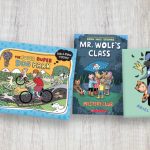When it comes to interacting with young audiences, you never know what you’re going to get. In today’s guest post for the Mackin Community blog, author Carmen Agra Deedy shares the story of an author visit, a hilarious student, and the joy of working with children.
I write books for young readers. In a pre-pandemic world, I visited over a hundred schools each year. I loved every nanosecond of those visits. And in thirty years of presentations, Author Day is still my favorite school event.
That said, there is one Author Day that is exemplary of all that is unpredictable, hilarious, and humbling about working with young—and mildly feral—children.
I arrived at the small rural school with only a few minutes to spare, checked in at the office, and was dispatched to the library. Artwork that the children had created to welcome their visitor lined the hallway like a yellow brick road. Grinning, I followed it all the way to the library door. The children and their teachers had already arrived, and the floor was carpeted with squirming, noisy kindergarteners. Their kinetic little bodies spanned the library from the pirate ship reading fort to the 398.2s.
A tallish woman in lime green linen and a cheery crayon necklace approached me and held out her hand. She introduced herself with a warmth I’ve come to expect from elementary school librarians. She then gestured toward a director’s chair in front of a wall to my right. The wall was plastered, floor to ceiling, with the usual assortment of library posters: athletes, authors, celebrities, and illustrators.
A crisp “clap-clap” (pause) “clap-clap-clap” was delivered by the librarian. It’s the universal call for silence used in schools across North America. The kids echoed the same rhythmic clap and grew quiet. After I was introduced, I smiled and plunged swiftly into a story, “Once, long ago, at the edge of a broadleaf forest, there lived an aged and toothless wolf . . . “
A good story casts its spell in increments. The first sign that it’s doing its good work is when the fidgeting slowly lessens, then stops all together. Small pockets of chatter grow quiet, bodies lean in toward the story, and everyone, including the storyteller, fully enters the imaginary world.
That is what is supposed to happen.
But that day there was one kid. Frankly, there’s nearly always one kid. But this child wasn’t interrupting, nor trying to roll my socks down, nor was he picking at facial orifices, nor belting out five verses of “The Wheels on the Bus.” No. He wasn’t doing any of the predictable stuff some kids will do during an assembly. And yet, what he was doing had become a near-insurmountable distraction.
He was staring.
You might rightly ask, “But aren’t they all staring? Isn’t that the point—that they are riveted?”
But it wasn’t that kind of absorption. This was a Medusa stare straight out of the pages of Bullfinch’s Mythology.
And as he was seated dead center, at my feet, I found it impossible to ignore him. He would focus on me with an intensity and curiosity that was weird and unnerving. He would then shift his focus to something just above my head, shake his head in bemusement, and mutter to himself—only to bring those searching hazel eyes back to me again. This cycle continued for thirty minutes.
With relief, I brought the story to a close . . . and that is when one of the teachers did the unthinkable. She stood up and asked a room of five- and six-year-old children, “Does anyone have any questions?”
Kindergarteners do not ask questions.
They raise their hands and make declarative statements, such as, “I got a puppy!” or “One time my brother ate half a worm!” or “My underwear is on backwards!” And once one child gets started, it’s a tsunami of declarations. A hundred little hands shot up at once. But I only noted one. The budding young hypnotist in the second row was waving furiously. Thirty years of experience—during which I have made every mistake in the book—told me NOT to call on him. But the temptation was too great. I had to know what was going on. So, I called on Medusa Boy.
He stood, pointed behind my head, and began, “Ma’am how—“
“Billy, no!” He was cut off by a panicked voice that could have only come from his teacher. I looked up to see a middle-aged woman stumbling madly through a sea of a hundred wriggling children.
Billy tried again, “Lady,” he said, “how in the WORLD—“
“Billy, NOOOO!” His teacher stepped over two children at once, which brought her only marginally closer to the irrepressible Billy. She gave me a pleading look. I held up a reassuring hand and, in the tone of a seasoned professional, said, “It’s okay. Kids have asked me every question under the sun.”
She opened her mouth to speak. Closed it.
Billy saw his chance, “So, Author Lady, how in the WORLD did you go from looking like that,” he pointed to a 20-year-old literacy poster of me on the wall. Then he directed that same accusing finger back at me, “to looking like that?“
“BILLYYYYYYY!” That teacher leapt toward Billy, took him by the hand, and pulled him firmly toward the door.
And still, the unsinkable Billy craned his neck back and shouted, “Well? How did ya?”
How could one resist such a question? Such a child?
“It’s called oldness, Billy!” I shot back.
“My teacher’s got that, too,” were the last words any of us heard from Billy.
It was the best Author Day EVER.
Children will tell you the truth, if you let them. And they expect the same courtesy in return. I tell children folktales and fairy tales, and stories from my childhood, yes. But I don’t tell them lies about the world. I never tell them death won’t come for someone they love, or that evil doesn’t exist, or that the neighborhood bully is really a nice kid. They know better. And they tell me the truth. Quid pro quo.
How often, really, does that happen in one’s adult life? And that is why children have been, and will ever be, until I take my last rattling breath, my favorite audience.






